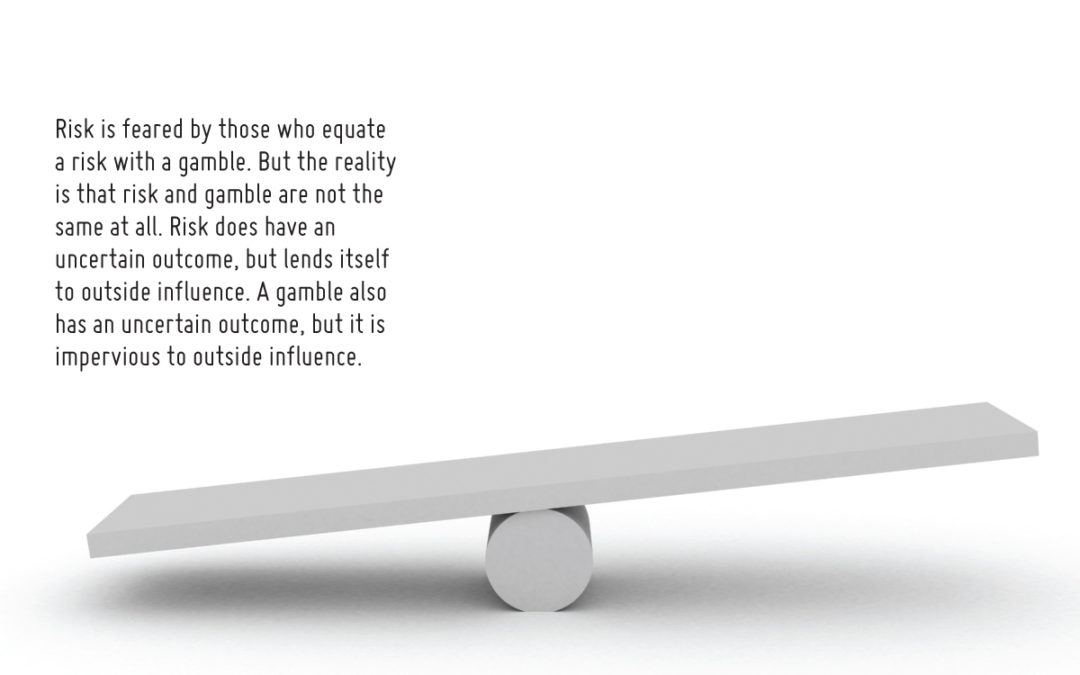SUCCESS IS NOT ATTAINED BY GAMBLING WITH THE FUTURE, BUT BY EFFECTIVELY MITIGATING RISK.
There are very few of us who have not, at one time or another, been intrigued with the idea of owning and operating a business of your own. While multiple triggers generate the desire to be an entrepreneur, they all boil down to one basic yearning: to be in control of our own future. As simple as that sounds, it shouldn’t surprise you that surprising that the vast majority fails to act on their entrepreneurial dream out of fear of taking risk.
Risk is the 600-pound gorilla in any success equation. Risk permeates the effort to be successful like garlic in an Italian restaurant. Risk both discourages and encourages. Risk paralyzes many while empowering others. Risk exposes cowards, heroes, fools and fortune hunters all at the same time. Some see risk as akin to swimming with hungry sharks, while others challenge risk like a lion tamer in a cage. The reality is that there can’t be a discussion about being successful – as either an entrepreneur or in one’s personal career – without considering the influence and impact of risk.
But there is some good news: Risk is overrated.
The reason risk is over-hyped is because most people equate taking a risk with taking a gamble. The truth is that risk and gamble are antonyms not synonyms. Risk does have an uncertain outcome, but that uncertainty can be mitigated and the outcome managed. On the other hand, a gamble has an unknown outcome that is impervious to outside influence.
Accordingly, in the context of achieving success it is important to differentiate between an outcome that is uncertain and an outcome that is unknown. It is the inability to comprehend the differences between a risk and a gamble that causes some to gamble with their future, while paralyzing others to face the risk to be successful.
There is irony in the fear of risk-taking because what causes a person to stand pat in the status quo of a career that seems to offer the security of certainty may be the biggest gamble of all. The truth is that when you are not in control of your own future, that future is not just uncertain, it is unknown.
Been There Done That
When I resigned my position as president of ITT Life (a subsidiary of The Hartford Insurance Co.) to lead a group in stating LifeUSA, the question most often asked of me by friends and family was, “Why would you abandon the certainty of a good job and steady paycheck and take on the risk of starting a new company?”
To my way of thinking, there was risk in walking away to start a new company, but that risk could be mitigated by changes taking place in the insurance industry, my experience and talent; not to mention the extraordinary talent of those who joined with me. From my perspective, the real risk would have been to continue to work in the bureaucratic environment that was Hartford. To stay at ITT Life under the aegis of Hartford would have been a true gamble because I knew that I was not in control of my future and could not have survived in that type of stultifying environment. That, and I would have been unhappy until the day I was fired. So my options were to take the real gamble of doing nothing and letting bureaucrats control my future or to take a risk I knew could be managed that offered both the psychic and material rewards of risk-taking.
Keeping a Risk and a Gamble in Perspective
Leaving the insurance industry to start an airline would have been a gamble, but using my experience and knowledge of the insurance industry to start a new insurance company was a risk well worth taking. Certainly there was the uncertainty that comes with starting any new company, but the outcome could be influenced by how well I managed that risk.
The secret to success is to be able to identify a risk that can be managed and staying away from a gamble that puts you at the mercy of an outcome you can’t control.
It’s a little bit like BASE jumping that it is still a risk for those who know what they are doing, but it is a pure gamble for those who attempt it without understanding how the manage the risks. The difference between a risk and a gamble all boils down to the person’s experience and ability to manage the risks. Every time a cardiologist performs heart surgery there is a risk of failure, but it’s the doctor’s knowledge, experience and training that reduces the risk to acceptable levels.
In the end, finding success as an entrepreneur – be it someone starting a new company or managing the department of a large company – turns on one’s ability to identify the difference between a risk that can be mitigated and a gamble that is immune to control. The successful entrepreneur eschews gambling (at least when it comes to business affairs) and attacks risk with the vengeance of a mongoose staring down a cobra until it has been beaten down to manageable levels.
The successful entrepreneur does not move forward until the risk has been fully defined and mitigated by sound, experienced analysis to the point that the potential for failure is insignificant compared to the potential for success and reward. And that is not a gamble.

